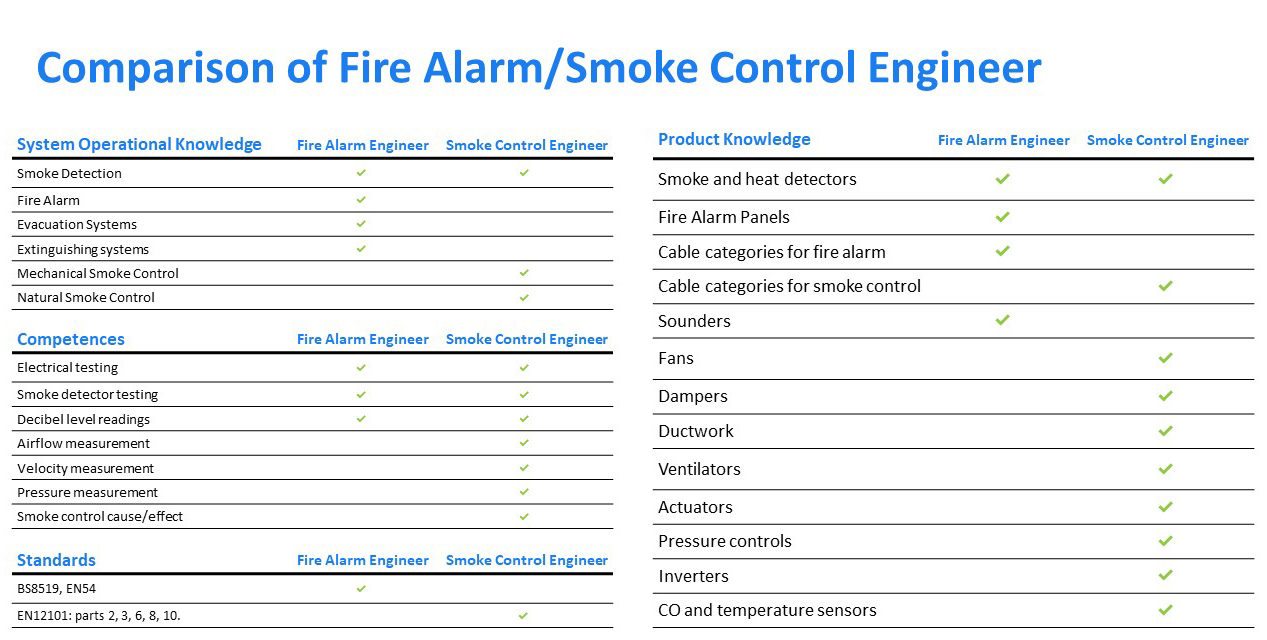 Smoke control systems can save lives – but only if they’re functioning correctly.
Smoke control systems can save lives – but only if they’re functioning correctly.
In this article, Group SCS Director Allan Meek discusses smoke control maintenance competency and how to make sure a competent, suitably skilled person is carrying out the maintenance work. For example, a fire alarm engineer might not have the required skillset to do this work, whereas a smoke control engineer would.
Smoke control has received a lot of press coverage since the Grenfell Tower fire. What used to be a little-known specialism is now firmly in the public eye, with more stories being featured in the news, including about smoke control systems failing. Recently it was revealed at the Grenfell Tower Inquiry that the smoke control system at Grenfell Tower had been inoperative for over a year before the installation of a new system as part of the building’s wider refurbishment.
Unfortunately, in our experience, it is common for clients to leave reported defects for many months before authorising corrective action. This may be due to a lack of available budget to effect repairs or a lack of understanding of the importance of an operational smoke control system.
Recently, after a fire broke out at New Providence Wharf, London (on May 7, 2021), a preliminary report released by London Fire Brigade revealed a serious failure of a smoke ventilation system resulted in the building acting like a “broken chimney” leaving residents’ only escape route smoke-logged (click here for full story).
London Fire Brigade Deputy Commissioner Richard Mills said: “The smoke ventilation system inside New Providence Wharf acted like a broken chimney leading to a potentially life-threatening situation. Had it not been for the exceptional actions of our firefighters and 999 control officers this could have had tragic consequences.
“Despite our response to this fire and drawing on the many lessons learned from the Grenfell Tower fire, in many cases we are sadly still not seeing a culture change in all those responsible for fire safety in high rise buildings.
“The New Providence Wharf fire needs to be an urgent wake-up call to all building owners and managers. Look at the fire safety solutions inside your building and take action if they are not performing correctly. It is too late to wait for a fire to see if they work.”
A recent warning issued by the London Fire Brigade states that some developers are even trying to ‘game the system’ to avoid adding more severe fire safety measures in place. The Assistant Commissioner for Fire Safety at the LFB, Paul Jennings, elaborates on the topic in an interview with BBC Newsnight :
“We have got examples where we think people are deliberately designing and building their buildings below that 18 metre, six floor threshold, because they know if they reach that threshold they would have to put advanced and more intricate fire safety measures in.”
Smoke control systems must be fully maintained and compliant
It is imperative that a smoke control system is fully maintained and compliant to ensure that if it is ever needed, it will work properly. The Regulatory Reform (Fire Safety) Order 2005 (RRO) states that a building’s “responsible person” (generally a building owner, manager or FM) must ensure proper operational service and maintenance of smoke control systems.
Regular testing of smoke control systems is also vital to ensure that any faults occurring between service visits are identified so they can be rectified.
The reality is weekly and monthly tests are problematic, particularly for high-rise residential buildings where there is no on-site maintenance presence and as a result, the checks are frequently overlooked.
We recently heard from a caretaker at the Grenfell Tower Inquiry that following the installation of the new system weekly tests were carried out and recorded. However, we also heard that he had been instructed to test only the ground floor of a 20-storey building which is wholly inadequate and highlights the importance of receiving advice from a competent specialist.
Evidence of failings in smoke control maintenance competency
Worryingly, despite the regulations in place, there is evidence of failings. London Fire Brigade’s (LFB’s) Fire Engineering thematic technical report (Jan 1-March 31, 2020) looks at ‘Identified trends from Building Regs Consultations and fire engineering audits’.
Part of the report looks at a second phase of visits by the Fire Engineering Group (FEG) audit programme (undertaken in opening quarter of 2020).
The report says the audits “concentrated solely on sleeping accommodation with mechanical smoke ventilation systems (MSVS) in the common parts, mostly flats and student accommodation.”
On each visit, answers to 10 questions were sought in respect of the fire engineered solution, including ‘Does it work? (i.e. was the engineered solution fully operationally effective at the time of visit. Whether the design worked in theory was also considered.)’.
This revealed a 20% failure rate.
Another question was ‘Do they know how it works? (i.e. the RP’s basic understanding of the solution and its importance.)’ [RP – Responsible Person]
This also revealed a 20% failure rate, with the report stating: “Most RPs knew in very general terms how the MSVS worked but, as before, few had any real understanding of how critical a properly functioning MSVS is to the continuing safe occupation of the premises.”
‘Is it being maintained? (i.e. is it subject to a suitable system of maintenance; are O&M manuals available.)’
This also saw a 20% failure rate.
The report said: “This was assessed more in line with the ‘Does it work?’ failure rate. Even though some RPs had a notional maintenance regime and/or O&M manuals in place, this made little difference to the ‘as found’ condition when visited.”
How to ensure smoke control maintenance competency
It must be understood that it is absolutely crucial that smoke control systems are fully maintained on a regular basis – and this means making sure you’ve got the correct person to do the maintenance – fully competent and with the correct knowledge to carry out the maintenance of smoke control systems.
It is common for smoke control system maintenance to be bundled in with fire alarm maintenance as though they are the same thing. However, there are vast differences in the skill sets of the people who know such systems best.
The skillset of a smoke control engineer is very different from that of a fire alarm engineer encompassing airflow and pressure differential measurement, fan, damper, and ventilator testing as well as smoke and CO detection (see comparison table). A fire alarm engineer may not be equipped to carry out the measurements required to confirm the correct operation of most mechanical smoke control systems.
So how do you know you’ve got the right person and/or company to carry out work on a smoke control system?
Third-party certification
The standard BS7346 Part 8, Components for smoke control systems. Code of practice for planning, design, installation, commissioning and maintenance gives details of maintenance requirements and templates for test records and service certificates. The standard recommends that third party certification is used as a measure of competence of specialists.
The Smoke Control Association (SCA) is the voice of the smoke control industry and members have to adhere to a strict code of conduct that includes being third party certificated under the IFC SDI 19 Certification scheme (developed by the SCA in partnership with IFC Certification).
David Mowatt, Chairman of the Smoke Control Association, recently recorded a short video message in support of the Fire Protection Association’s Know Your Building campaign (click here to find out more). One of the campaign’s main objectives is for third party certification to be a regulatory requirement for all fire safety services and products.
In his message of support, David Mowatt says: “You wouldn’t allow anyone who wasn’t suitably qualified to conduct work on gas appliances in your home, so why would you not demand the same when it comes to the specification, installation, and maintenance of your smoke control system in the workplace?”
Conclusion
If you are the responsible person or company for a building you must understand that when you get a smoke control system maintained, you must check that the maintenance contractors carrying out the work are suitably qualified, have a clear scope of works, and access to the parts, software, and training for the system. Additionally, it is crucial that a test log is maintained with full details of all tests carried out. It really is a false economy to cut corners when maintaining your smoke control system. Read more on the topic of maintaining smoke control systems in our Ultimate Guide to Smoke Control Maintenance.


